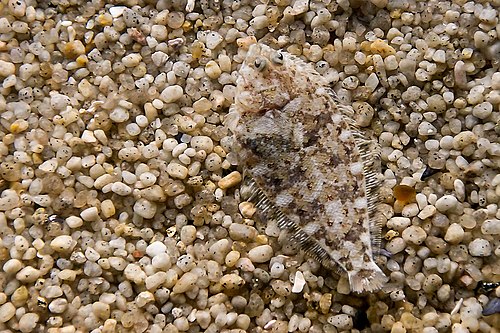Floundernoun
A European species of flatfish having dull brown colouring with reddish-brown blotches; fluke, European flounder, Platichthys flesus.
Floundernoun
(North America) Any of various flatfish of the family Pleuronectidae or Bothidae.
Floundernoun
A bootmaker's tool for crimping boot fronts.
Flounderverb
(intransitive) To flop around as a fish out of water.
Flounderverb
(intransitive) To make clumsy attempts to move or regain one's balance.
Flounderverb
(intransitive) To act clumsily or confused; to struggle or be flustered.
Floundernoun
A flatfish of the family Pleuronectidæ, of many species.
Floundernoun
A tool used in crimping boot fronts.
Floundernoun
The act of floundering.
Flounderverb
To fling the limbs and body, as in making efforts to move; to struggle, as a horse in the mire, or as a fish on land; to roll, toss, and tumble; to flounce.
Floundernoun
flesh of any of various American and European flatfish
Floundernoun
any of various European and non-European marine flatfish
Flounderverb
walk with great difficulty;
Flounderverb
behave awkwardly; have difficulties;
Flounder
Flounders are a group of flatfish species. They are demersal fish, found at the bottom of oceans around the world; some species will also enter estuaries.
Halibutnoun
A large flatfish of the genus Hippoglossus, which sometimes leaves the ocean floor and swims vertically.
Halibutnoun
A large, northern, marine flatfish (Hippoglossus vulgaris), of the family Pleuronectidæ. It often grows very large, weighing more than three hundred pounds. It is an important food fish.
Halibutnoun
lean flesh of very large flatfish of Atlantic or Pacific
Halibutnoun
marine food fish of the northern Atlantic or northern Pacific; the largest flatfish and one of the largest teleost fishes
Halibut
Halibut is the common name for three flatfish in the genera Hippoglossus and Reinhardtius from the family of right-eye flounders and, in some regions, and less commonly, other species of large flatfish. The word is derived from haly (holy) and butte (flat fish), for its popularity on Catholic holy days.



















